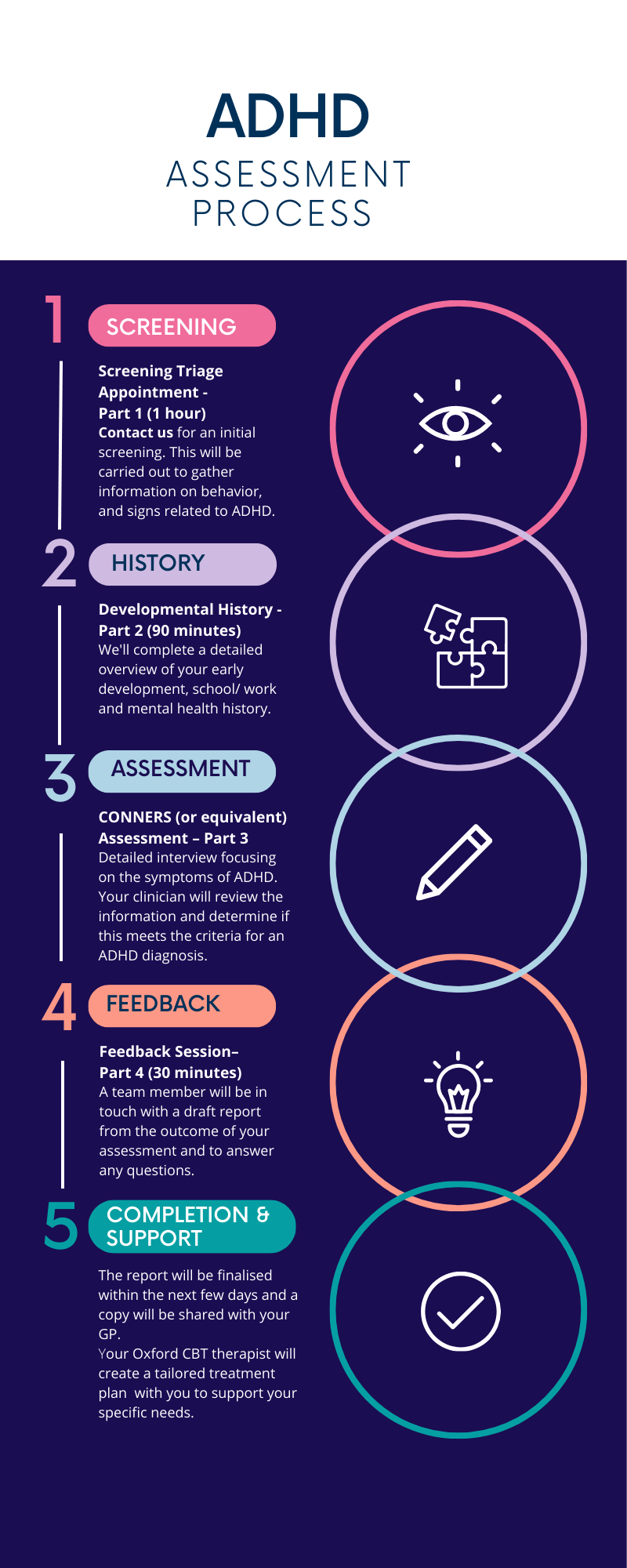Private Attention Deficit Hyperactivity Disorder (ADHD) Assessment And Diagnosis Oxford
Attention Deficit Hyperactivity Disorder (ADHD) is the term used to describe a condition that includes several symptoms including impulsiveness, difficulties concentrating on one task, and hyperactivity. ADHD is not a disease, and therefore, it cannot be “cured.” With effective treatments and therapies, however, children and adults with ADHD can receive meaningful assistance and successfully integrate it into their daily lives. ADHD diagnosis Oxford.
A Brief Overview Of ADHD
Attention Deficit Hyperactivity Disorder (ADHD) and Attention Deficit Disorder (ADD) are related, though distinct conditions. Both are neurological disorders, but only ADHD is defined by a consistent pattern of inattention and/or hyperactive impulsivity that interferes with daily functioning in at least two settings (for example, at school and home). ADHD impacts children and adults, boys and girls, and people of all backgrounds.
There are three types of ADHD:
- Predominantly inattentive type
- Predominantly hyperactive-impulsive type
- Combined inattention and hyperactive-impulsive type
Most children who are diagnosed with ADHD display symptoms of the combined category.


Are You Considering ADHD Testing And Diagnosis For Your Child?
People showing symptoms of ADHD can be diagnosed at an early age, though sometimes behaviours may only become apparent when a person’s circumstances change. Children, for example, are often diagnosed within the first few years of beginning school. If you are concerned about your child’s impulsivity, hyperactivity or ability to concentrate, ADHD testing and diagnosis may be a crucial step in ensuring your child receives meaningful assistance.
Three Primary Benefits to Parents of a Private ADHD Assessment :
- Gain an accurate understanding of your child’s specific and unique needs.
- Get the assistance you need to plan for and provide a great quality of life for your son or daughter.
- Minimise the effects of anxiety and low self-esteem, consequences that often affect children whose behaviours draw negative or unwanted social attention.
What To Expect At Your Initial ADHD Assessment Consultation with Oxford CBT
All testing and diagnosis begin with an initial 90 – minute consultation between parents, your child and an Oxford CBT Clinical Psychologist. During that session, your psychologist will work to understand your concerns as parents while also observing your child’s interaction, communication and behaviour. Your clinician will also use the time to gather information relevant to your child’s medical history and ongoing health. They will also administer the RCADS questionnaire, which screens for anxiety disorders and depression.
After your initial consultation, your Oxford CBT clinician will be prepared to identify whether specific symptoms or signs warrant further exploration and/or testing. The psychologist will also formalize these findings in a report and email it to parents. If traits of ADHD are identified, further assessments will be recommended and scheduled.
Examples of common assessments include:
- VANDERBILT, which screens for ADHD
- SHORT SENSORY PROFILE, which screens for sensory sensitivity
- ASSQ, which screens for high functioning autism
To begin the process we offer a ‘Triage appointment’ before a full assessment. Meet with one of our specialist clinicians to review your concerns, screen for the common signs of Autism and ADHD and get an overview of your current situation. Importantly, this ensures we put you on the right path in terms of your assessment plan, signposting or recommendations for further support. Reach out to us today or easily schedule your Triage appointment by clicking below.
**We provide Autism Assessment for 7+ years and for ADHD 12+ years.


A Brief Overview Of ADHD Testing
ADHD testing begins with behavioural observations in multiple environments, including parents, school and other professionals. Typically, we achieve this by asking parents and teachers (or other appropriate individuals) to complete one or more assessment surveys. These are important tools, as they help identify whether your son or daughter demonstrates similar behaviours in more than one setting.
Diagnostic Report And Follow Up
Once all information has been received, a report will then be completed and sent to parents. Oxford CBT will also schedule time with you to explain the report and provide practical recommendations for moving forward. These recommendations usually include a block of sessions with a therapist.
We are Here to Support You Help in Person and Online
Beginning the assessment process can be worrisome, but it doesn’t have to be overwhelming.
The Diagnostic Report will provide the following information:
- A specific ADHD diagnosis, if applicable
- Detailed insights into your child’s specific needs and strengths
- Specific recommendations for ongoing therapies and support
- If necessary, the report may also recommend further testing for conditions not addressed by ADHD evaluations
Following completion of testing, we also recommend that parents consult with their child’s general practitioner, especially if medication may be a helpful option.
Take an ADHD self-assessment Quiz
Complete this quick quiz so that we can gain a better understanding of your challenges and needs.
What Our Patients Have To Say
Begin your
wellness journey
Get in touch with us and we will assess your needs and expertly pair you with the right clinician and services to get you on the path to embracing life.
Already have an idea of your condition? Take a self-assessment screening for our clinicians to further evaluate.








